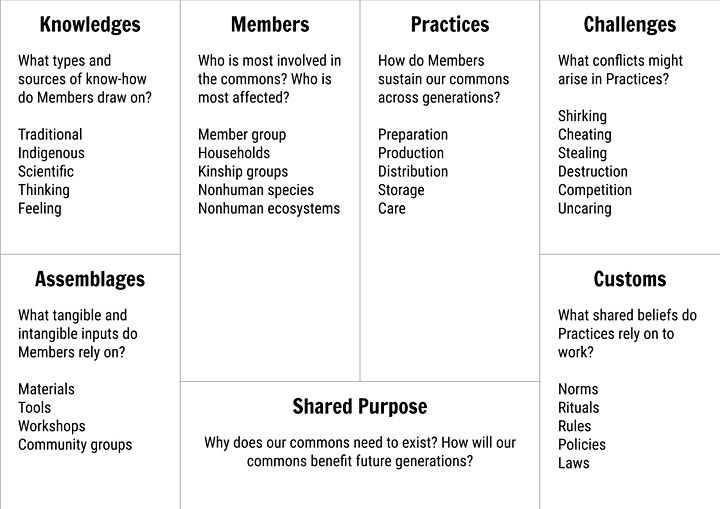
About this Event
SUMMARY
Are you engaged in a commons-related project – past, present, or future -- or do you want to integrate commoning into a project? This workshop is a supportive space for conference participants engaged with the commons to explore how they conceptualize and communicate the commons internally and externally. The workshop will focus on critiquing and adapting the Commons Model Canvas, an adaptation of the Business Model Canvas created by the workshop organizers to make sense of their own commoning practices. Participants are invited to complete a Commons Model Canvas for their project, share this work with the group for discussion, and to participate in adapting the Commons Model Canvas for future use. Based on our own research-through-design, participants can expect: to expand their knowledge about the commons and pluriversal design, to gain insightful peer feedback on their commoning projects, and to forge a potential peer network for future collaboration.
Please register by August 14. Please feel free to contact the organizers (see Organizers section) with any questions!
CONTEXT
The Commons Model Canvas (CMC) has been adapted from the Business Model Canvas, a widely-cited business development tool.
The success of the Business Model Canvas is rooted in the reframing of business modeling as a collaborative, interactive, and visual process. In our own design practice and research, we asked not only how to adapt the Business Model Canvas to support commoning but also how to introduce pluriversal design considerations into commoning. That is, commoning practices that account for diverse cosmologies, ontologies, and epistemologies within and connected to the commoning community.
The objective of this Commons Model Canvas is to supplement and transform commoning frameworks, namely the Institutional Analysis and Development (IAD) framework and the Socio-Ecological Systems (SES) framework, from scholarly, analytical frameworks into accessible, generative frameworks. To address pluriversal design, the Commons Model Canvas currently incorporates Indigenous wellbeing frameworks and social practice architecture in its visualized form and discourse. But this is really just a starting point!
In this workshop, we wish to invite other design researchers to use this tool within their project or praxis context and co-design a revised version that responds to their experiences.

PRE-WORKSHOP ACTIVITY
Participants who would like to present their Commons Model Canvas will be asked to perform schematization work prior to the workshop if they wish to share their work with the group. Participant-presenters will complete a version of the Commons Model Canvas using their project -- feel free to adapt it as you go and mark down your reflections along the way! Participant-presenters should submit their work a week before the conference so that others attending have a chance to look at it before the day of the workshop. In the process of completing their draft Commons Model Canvas, participant-presenters are asked to trace their thought process, obstacles, and observations.
FORMAT
This workshop is directed primarily at conference participants wishing to present their commoning projects, whether these are completed, current, planned, or envisioned.
The workshop is comprised of three parts:
- Introductions,
- Participant presentations and discussions, and
- Commons Model Canvas revision.
OUTCOMES
As a group, we expect the workshop will generate several longer-term outcomes:
- Revised Commons Model Canvas. The workshop will produce a revised Commons Model Canvas based on group discussion. This revised Commons Model Canvas will be made public and useable by PD scholars and practitioners.
- Journal paper. Workshop participants are invited to co-author a journal paper if there is interest. This paper will capture their individual cases, the results of the workshop, and the revised Commons Model Canvas.
- Cohort/Network. This workshop is offered as a seed for a potential cohort or network, based on participant interest in designing commons. There is a need for peer support among design researchers working on commons.
ORGANIZERS
Justin Sacks is a PhD researcher in design at Lancaster University. Justin’s research focus is pluriversal commoning and the transformation of commons frameworks and concepts into design tools to support commoning. Justin is an active member of the International Association for the Study of the Commons (IASC). Justin has led several workshops exploring design tools for commoning and published papers to develop tools for pluriversal commoning.
Markus Wernli is a Research Assistant Professor at PolyU School of Design in Hong Kong. Markus’ research focuses on communities of flourishing—the prototyping of social arrangements, that explore more regenerative, ecologically entangled ways of living, householding and designing. His ongoing research draws connections between local food systems and communal ecosystems on social and communal level to forge healthier relationships between what we breathe, eat, expel, wear, and grow. Markus has led workshops exploring food commons and published multiple papers that articulate explorations in relational commons as participatory design.
Event Venue & Nearby Stays
Urban Sciences Building, 1 Science Square, Newcastle upon Tyne, United Kingdom
USD 0.00
